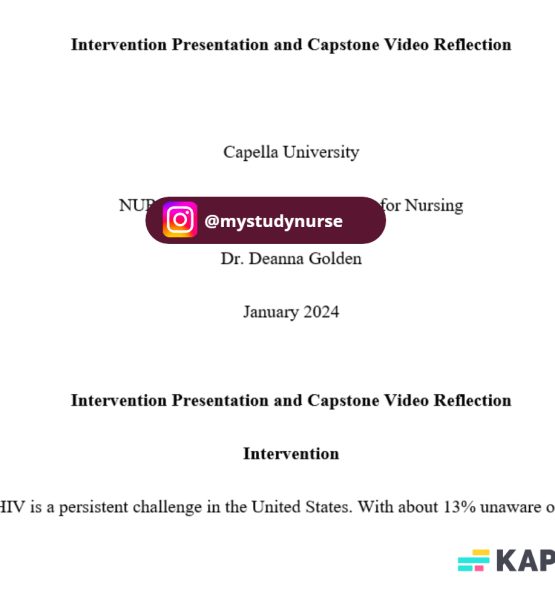
Intervention Presentation and Capstone Video Reflection
Capella University
NURS-FPX4900: Capstone Project for Nursing
Dr. Golden
January 2024
Availability:In Stock
HIV is a persistent challenge in the United States. With about 13% unaware of their status, health promotion and education is vital to inform individuals about the relevance of screening, diagnosis, and timely treatment. The intervention identified is the need for proactive engagement to make patients ad vulnerable population aware of self-care practices that help monitor or control symptoms. I focused on quality, cost, and safety of care since the three determine individuals’ ability to live healthy and fulfilling lives. Addressing the three reinforce individual and collective commitment to reducing health disparities common in underserved and under-resourced communities. Vulnerable population, largely the young groups between 13 and 29 years can access essential diagnosis, prevention, and treatment services to avoid delayed or postponed care across the continuum (Nyati et al., 2020). Focusing on increased HIV promotion and education helps patients, families, and healthcare providers identify evidence-based and patient-centered practices and resources relevant for treating HIV. HIV self-management practices enable patients to access tailored interventions for monitoring and controlling symptoms throughout the care process. Patients learn to improve quality, safety, and cost of care by adhering to lifestyle modifications, medications, and other strategies designed to prevent escalating symptoms.
My first experience was a conversation with a patient living with HIV. The interaction provided insights into the need for improvements that make quality, safe, and affordable care accessible to patients living with HIV. The patient from a low-resource setting agreed that it is challenging coping withquality, safety, and cost concerns evident in under-resourced and underserved communities. Challenges such as inadequate staffing, inconveniences in accessing ARVs, and low income that denies individuals from accessing healthy foods and other self-care measures prevent patients from living longer and healthier lives (Nyati et al., 2020). The patient expressed optimism in accessing better services by enrolling for Medicaid and Medicare programs. The patients also expressed desire to access primary care providers and specialists conveniently for education and counseling on tailored interventions for improving quality of life. Limited access to financial aid programs is a serious challenge that limits access to prescription drugs and other services appropriate for preventing escalating symptoms. Challenges accessing private insurance also undermine access to comprehensive care. However, the patient appreciated existence of the Affordable Care Act that facilitates access to emergency services, mental health counseling, talk therapies, prescription drugs, and overnight stays at hospitals. Qualifying for Medicaid and Medicaid is a significant step for patients living with HIV and from low-income settings to live healthier lives.
I also had a second conversation, which was an extension of an interaction with the patient living with HIV. The patient’s higher levels of need due to old age reinforced the need for well-coordinated practices, risk assessment, and accessible social and health care systems. The patient acknowledged the relevance of technologies such as telehealth in promoting timely and consistent access to social support, medications, therapies, and other HIV management plans. However, the patient expressed concerns over connectivity issues witnessed in low-resourced settings. The patient also recognized care coordination as a concept that enhances access to personalized care plans. I encouraged the patient to take advantage of community resources and technologies that strengthen the framework for managing HIV and referring patients to qualified professionals. The patient also appreciated the roles of community resources in providing medical and social support. Patients adhere to ARTs and make choices based on accessible resources and information across the continuum. The conversation with the patient revealed the need for flexible access to HIV support services, clinical interventions, and other pathways necessary for improving quality of life.
I acknowledge the relevance of new and advanced health information and communication in improving quality, cost, and safety of HIV management. Consultations delivered through text messages and videoconferencing enhance access to health promotion and education, behavioral intervention, and support for people with HIV. Melissa et al. (2021) recognized telehealth as a key consideration that improves linkages between primary care providers, specialists, and patients help individuals to live healthier lives. During telehealth sessions, a patient accesses information on drugs, self-care practices, and other tailored mechanisms needed to sustain viral suppression (Melissa et al., 2021). The flexible access to accurate and complete information encourages promotes medication adherence and positive health-seeking behaviors and attitudes. In this case, healthcare professionals educate patients on self-monitoring and controlling of symptoms including consistent measuring of viral loads and CD4 levels. Telehealth also promotes interdisciplinary collaboration, where primary care providers and specialists utilize videoconference sessions to engage patients and inform them about evidence-based and personalized approaches for managing complexities associated with HIV care.
Health policies influence the quality, cost, and safety of patient care. For this project, I considered the Affordable Care Act (ACA) as one of the viable legislations that highlights barriers and enablers of successful HIV management. Key highlights of ACA include expanded and assured coverage for people with pre-existing conditions. Patients take advantage of expanded Medicaid coverage, reduced cost of prescription drugs, and access to preventive services (Ginossar et al., 2019). Satre et al. (2020) acknowledged the relevance of ACA in encouraging coordinated care for people with HIV. Patients and families benefit from a healthcare system that streamlines access to medical and non-medical services. Broader Medicaid eligibility allows low-income populations to access services that safeguard them from a damaged immune system (Satre et al., 2020). Similarly, there are opportunities to initiate and sustain coordinated care for those with HIV and related complications.
Reviews
There are no reviews yet.